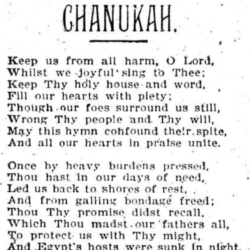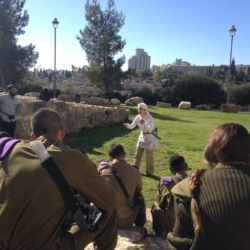| Source (Hebrew) | Translation (English) |
|---|---|
מָעוֹז צוּר יְשׁוּעָתִי לְךָ נָאֶה לְשַׁבֵּֽחַ תִּכּוֹן בֵּית תְּפִלָּתִי וְשָׁם תּוֹדָה נְזַבֵּֽחַ לְעֵת תָּכִין מַטְבֵּֽחַ מִצָּר הַמְנַבֵּֽחַ אָז אֶגְמֹר בְּשִׁיר מִזְמוֹר חֲנֻכַּת הַמִּזְבֵּֽחַ׃ |
Keep us from all harm, O Lord, Whilst we joyful sing to Thee; Keep Thy holy house and word, Fill our hearts with piety: Though our foes surround us still, Wrong Thy people and Thy will, May this hymn confound their spite, And all our hearts in praise unite. |
רָעוֹת שָׂבְעָה נַפְשִׁי בְּיָגוֹן כֹּחִי כָּלָה חַיַּי מֵרְרוּ בְקֹשִׁי בְּשִׁעְבּוּד מַלְכוּת עֶגְלָה וּבְיָדוֹ הַגְּדוֹלָה הוֹצִיא אֶת־הַסְּגֻלָּה חֵיל פַּרְעֹה וְכׇל־זַרְעוֹ יָרְדוּ כְּאֶֽבֶן בִּמְצוּלָה׃ |
Once by heavy burdens pressed, Thou hast in our days of need, Led us back to shores of rest, And from galling bondage freed; Thou Thy promise didst recall, Which Thou madst our fathers all, To protect us with Thy might, And Egypt’s hosts were sunk in night. |
דְּבִיר קׇדְשׁוֹ הֱבִיאַֽנִי וְגַם שָׁם לֹא שָׁקַֽטְתִּי וּבָא נוֹגֵשׂ וְהִגְלַֽנִי כִּי זָרִים עָבַֽדְתִּי וְיֵין רַֽעַל מָסַֽכְתִּי כִּמְעַט שֶׁעָבַֽרְתִּי קֵץ בָּבֶל זְרֻבָּבֶל לְקֵץ שִׁבְעִים נוֹשַֽׁעְתִּי׃ |
Holy shores received us then, Where our stay was short, and we Pressed by foes and evil men, Suffered for apostasy; But Thy mercy kept us still— Sinning oft against Thy will; After threescore years and ten, Thou, Lord, didst bring us back again. |
כְּרוֹת קוֹמַת בְּרוֹשׁ בִּקֵּשׁ אֲגָגִי בֶּן־הַמְּדָֽתָא וְנִהְיָתָה לוֹ לְפַח וּלְמוֹקֵשׁ וְגַאֲוָתוֹ נִשְׁבָּֽתָה רֹאשׁ יְמִינִי נִשֵּֽׂאתָ וְאוֹיֵב שְׁמוֹ מָחִֽיתָ רֹב בָּנָיו וְקִנְיָנָיו עַל־הָעֵץ תָּלִֽיתָ׃ |
Haman’s plans all came to naught, Cunning plans that he had made, When to harm us he had sought, And his ruin he had laid; For injustice, worldly gain, Never man from death retains. Lord! Be Thou our helper still, And help us do Thy holy will! |
יְוָנִים נִקְבְּצוּ עָלַי אֲזַי בִּימֵי חַשְׁמַנִּים וּפָרְצוּ חוֹמוֹת מִגְדָּלַי וְטִמְּאוּ כׇּל־הַשְּׁמָנִים וּמִנּוֹתַר קַנְקַנִּים נַעֲשָׂה נֵס לַשּׁוֹשַׁנִּים בְּנֵי בִינָה יְמֵי שְׁמוֹנָה קָבְעוּ שִׁיר וּרְנָנִים׃ |
Then came Javan, in his rage, Razing tower, wall and gate; In the Hasmonean age, Lord. Thy house to desecrate! But the oil that still remained Many virtues still contained; So Thy house and name, O Lord, Sustains Thy consecrating word! |
This is “Chanukah” a free or interpretive rhyming English translation of Maoz Tsur, a 13th century piyyut attributed to Mordecai ben Yitsḥak haLevi (based on his acrostic signature). Employing the same rhyme scheme as the “Star Spangled Banner,” the anonymous translator implicitly suggests its proud usage as a patriotic hymn for American Jewry of the United States on Ḥanukkah. At the time, Zionism as a political force was still in its relative infancy and American rabbis were explicitly referring to the United States as a new Canaan. In conjunction with the Columbian Exposition in Chicago, the United States had just hosted the World’s Parliament of Religions — and representatives of Judaism were treated on par with that of every other representative. Jews worldwide were looking to the United States as a golden medinah amidst the shocking and persistent anti-Jewish violence in Eastern Europe and elsewhere. At a time when the late 18th century Enlightenment promise of Emancipation and Religious Freedom remained unfulfilled in most places, for a generation yearning to realize Jewish safety amidst some measure of national pride, this use of Maoz Tsur compares with the adoption of Eugène Pottier’s “The Internationale” (1871), Naphtali Herz Imber’s “Hatiḳvah” (1878), and Ḥayyim Naḥman Bialik’s “The People’s Blessing” (a/k/a Teḥezaqnah, 1894) as anthems to carry forward a vision of the end of Exile. –Aharon Varady
Source

“מָעוֹז צוּר | Maoz Tsur in a rhyming English translation (1893)” is shared through the Open Siddur Project with a Creative Commons Public Domain Dedication 1.0 Universal license.











Leave a Reply